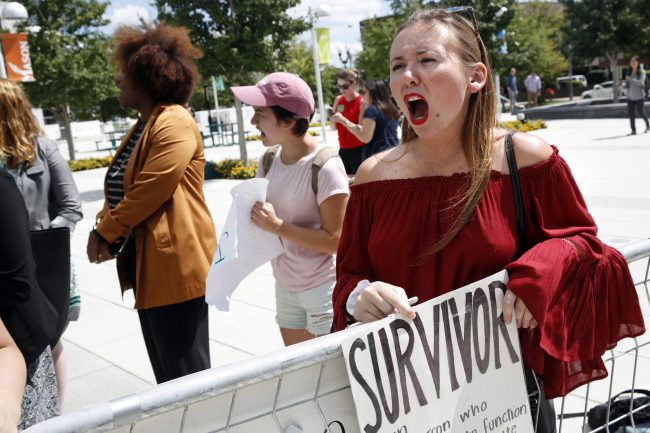WASHINGTON – The Trump administration on Friday scrapped Obama-era guidance on investigating campus sexual assault, replacing it with new instructions that allow universities to require higher standards of evidence when handling complaints.

Education Secretary Betsy DeVos has said that President Barack Obama’s policy had been unfairly skewed against those accused of assault and had “weaponized” the Education Department to “work against schools and against students.”
The change is the latest in Trump’s broader effort to roll back Obama policies. Women’s rights groups slammed Friday’s decision, saying it will discourage students from reporting assault.
WATCH: Joe Biden speaks out about sexual assault on U.S. college campuses

The guidance released in 2011 and then updated in 2014 instructed universities to use a “preponderance of the evidence” standard when assessing and investigating a claim of sexual assault.
DeVos’ new interim guidelines let colleges choose between that standard and a “clear and convincing evidence” standard, which is harder to meet. Those rules will be in place temporarily while the Education Department gathers comments from interest groups and the public and writes new guidance.
“To be very clear, one sexual assault is one too many. It is horrible and lamentable,” DeVos told those attending the Mackinac Republican Leadership Conference on Friday night in Michigan.
READ MORE: UBC faces new sex assault human-rights case
“But the current failed system didn’t work for students, it didn’t work for institutions, it didn’t work for anyone,” she said in explaining the decision. “It didn’t work because unelected and unaccountable political appointees pushed the guidance through without any period for comment from those who walk side by side with students every day. The time of ineffective and inefficient mandates is over.”
Fatima Goss Graves, president and CEO of the National Women’s Law Center, said the new rule will have a “devastating” impact on students and schools.
WATCH: U of S takes proactive approach in hopes of preventing sexual assaults on campus

“It will discourage students from reporting assaults, create uncertainty for schools on how to follow the law, and make campuses less safe,” Graves said in a statement. “This misguided directive is a huge step back to a time when sexual assault was a secret that was swept under the rug.”
The Education Department’s Office for Civil Rights is investigating 360 sexual violence cases at 258 postsecondary institutions.
READ MORE: Trent University clubs and groups offer safe places for students
A student may choose whether to report a claim of assault to police or to have it investigated by a university under a federal provision against sexual discrimination. Some students choose not to turn to law enforcement because many such cases go unprosecuted as police and the courts require higher standards of evidence. Students may also feel more comfortable dealing with university investigators rather than with police following a trauma.
WATCH: Focus Montreal: Sexual violence on campus

Andrew Miltenberg, a New York lawyer who represents students accused of sexual assault, said Obama’s standard ignored the presumption of innocence and put the burden on the accused to prove the assault did not happen. He said the system proposed by DeVos is “a much more stringent standard and one that is less open to subjective interpretation.”
Sen. Patty Murray of Washington, the senior Democrat on the Senate’s committee on education, said DeVos’ decision “may cause survivors of sexual assault to go back into the shadows, allowing predators to continue to roam college campuses and the epidemic of college sexual assault to spread.”
READ MORE: New trial ordered for Toronto man convicted of sex assault of York U student
The department did not say how long the interim rule is expected to be in effect. Clare McCann, a higher education expert with the New America think-tank , said it will likely take the department more than a year to finalize a new rule.



Comments